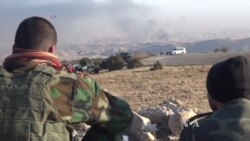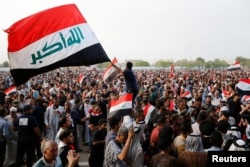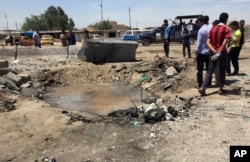The White House is urging Iraqi leaders to move swiftly to create a central government that will bridge sectarian divides and unite the country as it battles against Islamic State.
Washington's alarm about Baghdad's growing political turmoil intensified after anti-government protesters stormed the fortified Green Zone and seized the parliament building over the weekend to demand an end to political bickering and corruption.
"If there are no reforms, the whole government should be replaced," said one of the protesters, echoing a common cry.
The Obama administration says Iraq needs a stable, central government to help push back Islamic State militants, who still occupy large swaths of the country.
The country has long been divided among sectarian lines, including Kurdish, Sunni and Shi'ite. But now, there are fissures even within particular groups, leading some observers to suggest it may be even more difficult for Baghdad to have a unified government any time soon.
The anti-government protesters were dispatched by influential Shi'ite cleric Muqtada al-Sadr to criticize the government led by another Shi'ite, Prime Minister Haider al-Abadi.
U.S. ‘concerned’
President Barack Obama said he is "concerned" about the chaos surrounding Abadi's government.
While he said Abadi has been “a good partner for us," he added in remarks in Riyadh last month that "there is significant dissension and disputes even among the Shi'ite power blocks."
The U.S. has backed Abadi's effort to build a central government across sectarian lines. While saying it is ultimately up to the Iraqis to decide what kind of government they will form, Obama urged leaders to move quickly, given the range of political and security challenges.
"They've got a lot on their plate," Obama said. "Now is not the time for government gridlock or bickering."
But what does the growing problem signal?
"We don't know," said James Jeffrey, former U.S. Ambassador to Baghdad under Obama and current Philip Solondz fellow at the Washington Institute for Near East Policy.
"There's a probability, let's say 60 percent, that Iraq will stabilize at about the same level of — from our perspective — dysfunctionality," Jeffrey said.
Other options
The U.S. is hoping a stable, central government will help Iraqi troops and local forces beat back Islamic State.
But Jeffrey is pessimistic that Iraq's weak government can assume "this super warrior posture to drive out ISIS [Islamic State] through an act of national unification that they have never achieved in their history."
If the U.S. does not contribute more militarily, Jeffrey added, "we should continue fighting against ISIS to the extent that we can find allies."
"If the Iraq government descends into a puddle of ineptness and entropy then there's the Kurds, there's local Sunni tribes, there's all kinds of people we can recruit and train," Jeffrey said.
With the help of the U.S.-led coalition airstrikes and the increasing number of American military advisers, the Iraqi army and local forces have made gains in recent months.
But the growing U.S. military presence comes at a cost. A U.S. service member was killed Tuesday near Mosul during a U.S. military effort to help Christian and Kurdish fighters battling Islamic State in the area.
The Obama administration has predicted that Iraq and local forces, backed by the coalition, will recapture Islamic State's stronghold, Mosul, by the end of the year.
Even though Islamic State has lost about 40 percent of the territory it once held in Iraq, observers say the looming political instability will not help in the fight to defeat the extremists.







